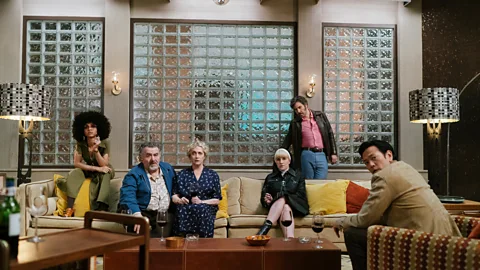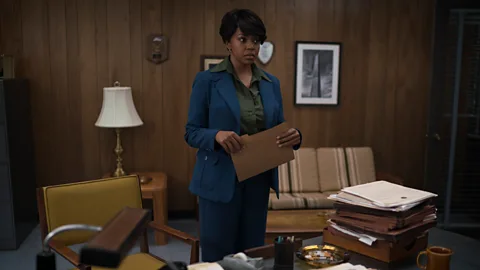Amazon’s new thriller sees Al Pacino heading up a group of 1970s vigilantes taking revenge on Fuhrer-lovers. It’s moving and provocative, writes Hugh Montgomery.
How do you reckon with the Holocaust on screen? After all, it was an event of such monumental horror that any fictional exploration of it risks seeming inadequate, or tawdry, or both. The recent film Jojo Rabbit certainly showed how not to reckon with it, looking at it from the oblique perspective of a young Nazi, using it as the architecture for a cutesy, coming-of-age story. By contrast Amazon’s new show Hunters pulls off something rather miraculous. At once, it manages to be an affecting memorial and top-grade entertainment – a combination that somehow isn’t half as sacrilegious as it sounds.
More like this:
Executive produced by modern-horror maestro Jordan Peele, it establishes its premise with an audacious opening sequence at a summer barbecue: the year is 1977, and three decades on from their defeat in Europe, Nazis have woven themselves into the fabric of the US establishment. Set against this is the brutal wake-up call received by Jonah Heidelbaum (Logan Lerman), a 19-year-old Jewish guy, via the murder of his grandmother Ruth, which leads him into the orbit of her old friend and fellow concentration-camp survivor Meyer Offerman (Al Pacino). Offerman reveals that the pair of them, alongside a ragbag inter-generational crew of men and women, have been doling out vigilante justice to émigré Fuhrer-lovers. Soon enough, Jonah has become the gang’s latest recruit – and as they battle to exact retribution for the wrongs of World War Two, those they are hunting bring closer to fruition a plot to establish a Fourth Reich in the US.
If there’s one obvious reference point for creator David Weil’s blackly comic thriller series, it is Quentin Tarantino. From the show’s exploitation-movie premise, to its period funk-soul soundtrack, splashy violence and pop culture intoxicated dialogue (there are back-and-forths about the merits of Batman and Robin and the moral outlook of Darth Vader, among other things), the influence of the director can hardly be ignored. What’s more of course, Tarantino gave us his own Holocaust revenge fantasy with 2009’s Inglourious Basterds.
 Amazon Prime Video
Amazon Prime VideoBut framing Hunters primarily as ‘Tarantino-esque’ would be wrong. In fact, many of the more obviously Tarantino-esque flourishes – the fantastical sequences introducing the crew, for example – feel surplus to requirements. What’s more interesting, and surprising, than its stylised aesthetic is its moral seriousness – and its willingness to engage fully with the traumas of the past, much like Heidelbaum is forced to. In the production notes, Weil describes how the story for Hunters was inspired by his grandmother Sara, a survivor of Auschwitz and Bergen-Belsen, who he describes as the “ultimate badass of wartime Poland”. Just as important as the colourful action heroics of the main timeline are the oppressively muted flashback sequences which return us to the camps with a young Ruth and Offerman.
The procedural grimness of their initiation – the hair-cutting and the serial-number-tattooing – features alongside some sequences of utterly gruesome fancifulness, such as a human chess game with the inmates as living, breathing ‘pieces’ on a giant turf board, who are murdered by their opposite numbers as they are captured. You could perhaps argue such embellishments are unnecessarily sensationalist, but in their luridness, they have an agonising power that really leaves its mark.
The show is also given gravitas by the weight of the performances. With a thick Eastern European accent, Pacino is at once on typically ripe form, and also poignantly solemn when he needs to be, while Lerman, as his protégé, makes for a sympathetic audience proxy. As for the rest of the team, in the five episodes given out for review, the sketching of them is variable: Josh Radnor makes an engaging impression as a dude-like actor, aka “the Jewish Robert Redford”, but others remain enigmatic, or simply thinly-imagined, at this stage. “In time you’ll come to know their stories, their secrets,” says Offerman to Heidelbaum early on, and you can but hope a few more will be unfurled to us viewers too.
Outside the core gang, though, two contrastingly compelling performances represent the forces of good and evil. On one side, there’s Greg Austin’s ethereally menacing young Nazi assassin, and on the other, Jerrika Hinton’s down-to-earth Millie Malone, an FBI agent hunting for an explanation for a series of unexplained OAP deaths, while simultaneously contending with her own battles in a professional world beset by prejudice.
Striking big
Which brings us to where Hunters really strikes big. Not just wrestling with history, despite looking back to the 1940s, and being set in the 1970s, it also has a sharp contemporary resonance – no surprise given the involvement of Peele, who has proven with his films Get Out and Us that he knows exactly how to strike fear into our hearts by tapping into the political zeitgeist. At its heart, of course, Hunters is a show about how nice old liberal Western democracies are never far away from fascism – a point which arguably could not feel more pertinent at a time when in the US, children have been interred in cages, and in the UK only this week, one of the Prime Minister’s aides stepped down following the alleged emergence of old online comments he had made in which he appeared to advocate eugenics. (Hunters should also make for an interesting companion piece to HBO’s forthcoming adaptation of Philip Roth’s The Plot Against America, which counterfactually imagines what the country would have been like had the Nazi sympathiser Charles Lindbergh been elected as president in 1940).
 Amazon Prime Video
Amazon Prime VideoIn Hunters, we see not only how Nazis have become easily embedded in their new homeland, securing significant positions in institutions from Nasa to the government, but also how the intolerance at the core of their reprehensible ideology is reflected in US society more generally – whether it’s a bully-boy using anti-Semitic language against Heidelbaum, or Malone wrestling with unspoken bigotry as a black gay woman in a milieu dominated by white straight men. One of the most charged scenes sees the gang hunt down a former Leni Riefenstahl-esque filmmaker, who has now remodelled herself as political consultant. They find her in her sleek modernist home in the New York suburbs, regaling a well-heeled drinks party, with a speech praising the ‘conservative principle of hard work’, sneering at ‘welfare queens’, and emphasising the need to put ‘America first’. (Weil makes no secret of his political leaning).
Yet this is not to say the show is simply some gung-ho piece of wish fulfilment – another fact which distances it from Tarantino. As the episodes progress, Weil seems invested in showing how the thirst for vengeance leaves a stain on the avengers – not least Heidelbaum, whose ears begin to ring with the sound of his conscience. You sense, also, that the picture of heroism and villainy is only going to get more complicated before the series is out.
It may seem odd to suggest that a show so self-consciously junky on first appearance could be historically and ethically instructive. But at a time when as many as one in six people around the world either deny the Holocaust has happened, or suggest it has been exaggerated, it powerfully brings home not only what Jewish people have suffered, but what they, and other minorities in the West, could suffer again.
★★★★☆
Hunters launches on Amazon Prime Video today
Love TV? Join BBC Culture’s TV fans on Facebook, a community for television fanatics all over the world.
If you would like to comment on this story or anything else you have seen on BBC Culture, head over to our Facebook page or message us on Twitter.
And if you liked this story, sign up for the weekly bbc.com features newsletter, called The Essential List. A handpicked selection of stories from BBC Future, Culture, Worklife and Travel, delivered to your inbox every Friday.


Post a Comment